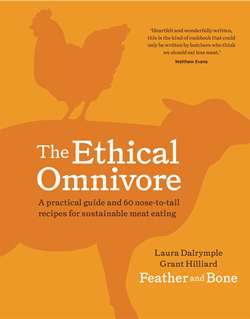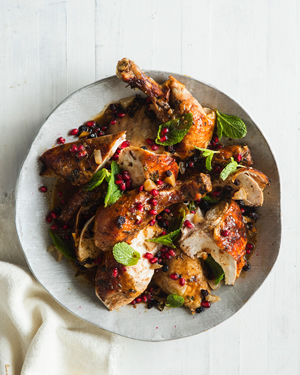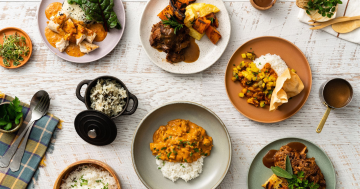By Christine Salins.
 The Ethical Omnivore could be the most important book you read all year. Published by Murdoch Books (RRP $39.99), this handbook to more ethical and sustainable eating shows how we can live with less impact on animals and the environment.
The Ethical Omnivore could be the most important book you read all year. Published by Murdoch Books (RRP $39.99), this handbook to more ethical and sustainable eating shows how we can live with less impact on animals and the environment.
It’s written by Laura Dalrymple and Grant Hilliard, owners of Feather and Bone Providore in Sydney, who specialize in meat from pasture-raised heritage breeds of sheep, cattle and pork, Sommerlad chicken and other sustainably produced products.
Unlike the standard white chook, Sommerlad chicken was specially bred to be a slow-growing flavoursome table bird. A section of the book is devoted to this prized product.
“Australian meat chicken production is an unnatural monoculture and it took us eight years to find a commercial meat chicken breed other than the ubiquitous standard white broiler,” they write.
The pair are committed to full transparency in meat production, buying only whole animals which they break down and supply to both retail customers and restaurants. Many of the recipes in the book come from their customers, including the Moroccan-spiced chicken here.
More than butchers, Dalrymple and Hilliard are educators and activists for a better way of farming. Every day for 14 years, they’ve been answering questions such as “‘Where does my meat come from?”, “How did it die?” and the even thornier question, “Should I eat meat at all?”.
For this passionate duo, the answer is yes, with the rider that it be from “food production systems that foster sustainable biodiversity, resilience and vitality in soil, plant, animal and human communities”.
“Every time we buy something, we vote for the system that produced it,” they write, adding that the problems with intensive food production systems are not restricted to meat. “…Intensive plant agriculture is riddled with unacceptable practices that have profound environmental impacts.”
The free market system must offer a compelling alternative to intensive food production, they argue. In the case of meat, that means “more modest numbers of animal raised in a sustainable, compassionate and ecologically beneficial system.”
Furthermore, they say, because meat from farms outside the intensive food system is more full-flavoured, it is more satiating, which in turn means that people eat less of it.
Interspersed among their stories, the authors offer recipes for everything from simple and easy weeknight meals to slow roasts for special occasions. There are recipes for Cornish pasties, pies, ribs, lamb shanks, pork belly, some offal, healing broths, even lamb on a spit Greek-style.
An Oaxacan-style braised goat dish sounds fabulous, as does Sri Lankan beef curry and the various recipes for roast chicken, such a versatile dish that can be dressed up or down depending on your whim.
 Katie’s orange blossom Moroccan-spiced chicken
Katie’s orange blossom Moroccan-spiced chicken
Serves 4 to 6
80 g raw almonds
1 large (about 2 kg) pasture-raised chicken
3 tablespoons olive oil
1 to 2 garlic cloves, crushed
1 tablespoon Herbie’s Spices ras el hanout or other high-quality Moroccan spice blend
1 tablespoon orange blossom water
1 tablespoon pomegranate molasses
Finely grated zest and juice of 1 lemon
2 handfuls coriander leaves, coarsely chopped
2 tablespoons Bitton Orange Jelly, or your favourite bitter orange marmalade
75 g (½ cup) currants
50 g (1 cup firmly packed) coarsely chopped mint
Seeds of 1 pomegranate
75 g coarsely chopped
preserved lemon rind
Preheat oven to 180°C. Place almonds on a baking tray and toast for 5 minutes, or until lightly golden. Remove from oven and coarsely chop.
Dry chicken inside and out with paper towel, and place on a wire rack set in a roasting tin. Combine olive oil, garlic, ras el hanout, orange blossom water, pomegranate molasses, lemon zest, half the lemon juice and half the coriander.
Rub chicken all over with oil and spice mix, place in oven and roast, basting twice, for 1 hour–1 hour 15 minutes or until the juices run clear when a thigh is pierced with a skewer. Remove chicken from oven, transfer to a plate to rest, and pour roasting juices into a saucepan.
Add orange jelly to juices in pan, place over medium heat, and cook for 5–10 minutes or until reduced by half. Remove from heat and add remaining lemon juice.
Carve chicken into pieces and arrange on serving platter. Pour orange sauce over chicken, then scatter with almonds, currants, mint, remaining coriander, pomegranate seeds and preserved lemon. Serve with cous cous, brown rice or crispy potatoes and a salad of mixed leaves.
Recipe and images from The Ethical Omnivore by Laura Dalrymple and Grant Hilliard, photography by Alan Benson. Murdoch Books RRP $39.99.



